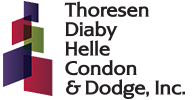How inflation could affect your financial statements
Business owners and investors are understandably concerned about skyrocketing inflation. Over the last year, consumer prices have increased 8.3%, according to the latest data from the U.S. Bureau of Labor Statistics. The Consumer Price Index (CPI) covers the prices of food, clothing, shelter, fuels, transportation, doctors’ and dentists’ services, drugs, and other goods and services [...]

